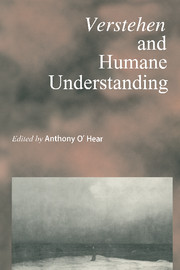Book contents
- Frontmatter
- Contents
- Notes on Contributors
- Preface
- ‘Two Cultures’ Revisited
- Rational and Other Animals
- Vico and Metaphysical Hermeneutics
- Three Major Originators of the Concept of Verstehen: Vico, Herder, and Schleiermacher
- Weber's Ideal Types as Models in the Social Sciences
- Verstehen, Holism and Facism
- Interpretation in History: Collingwood and Historical Understanding
- The Meaning of the Hermeneutic Tradition in Contemporary Philosophy
- Science and Psychology
- To Mental Illness via a Rhyme for the Eye
- Can There be an Epistemology of Moods?
- Feeling and Cognition
- Believing in order to Understand
- Data and Theory in Aesthetics: Philosophical Understanding and Misunderstanding
- Anti-Meaning as Ideology: The Case of Deconstruction
- Perictione in Colophon
- Index of Names
Rational and Other Animals
Published online by Cambridge University Press: 17 May 2010
- Frontmatter
- Contents
- Notes on Contributors
- Preface
- ‘Two Cultures’ Revisited
- Rational and Other Animals
- Vico and Metaphysical Hermeneutics
- Three Major Originators of the Concept of Verstehen: Vico, Herder, and Schleiermacher
- Weber's Ideal Types as Models in the Social Sciences
- Verstehen, Holism and Facism
- Interpretation in History: Collingwood and Historical Understanding
- The Meaning of the Hermeneutic Tradition in Contemporary Philosophy
- Science and Psychology
- To Mental Illness via a Rhyme for the Eye
- Can There be an Epistemology of Moods?
- Feeling and Cognition
- Believing in order to Understand
- Data and Theory in Aesthetics: Philosophical Understanding and Misunderstanding
- Anti-Meaning as Ideology: The Case of Deconstruction
- Perictione in Colophon
- Index of Names
Summary
The soul has two cognitive powers. One is the act of a corporeal organ, which naturally knows things existing in individual matter; hence sense knows only the singular. But there is another kind of power called the intellect. Though natures only exist in individual matter, the intellectual power knows them not as individualised, but as they are abstracted from matter by the intellect's attention and reflection. Thus, through the intellect we can understand natures in a universal manner; and this is beyond the power of sense.
(St Thomas Aquinas, Summa Theologiae, Ia, q. 12, a 4; responsio.)Introduction
I shall approach the theme of understanding and verstehen by way of considering the purported (and I believe, real) difference between human and other animals in respect of the intellectual rationality of the former.
English-language philosophy in the broadly analytical tradition is currently in a humanistic phase. I mean by this that there is now a widely-shared inclination to reassert the existence and the validity of interpretative and evaluative styles of description and explanation. Sometimes (indeed, for the most part) this gives rise to forms of conceptual dualism, as in some of the uses made of the contrast between scientific and manifest images, objective and subjective views and causal and rational explanations.
Of course, to observe a duality is not necessarily to accord parity of esteem to both parties.
- Type
- Chapter
- Information
- Verstehen and Humane Understanding , pp. 17 - 28Publisher: Cambridge University PressPrint publication year: 1997

